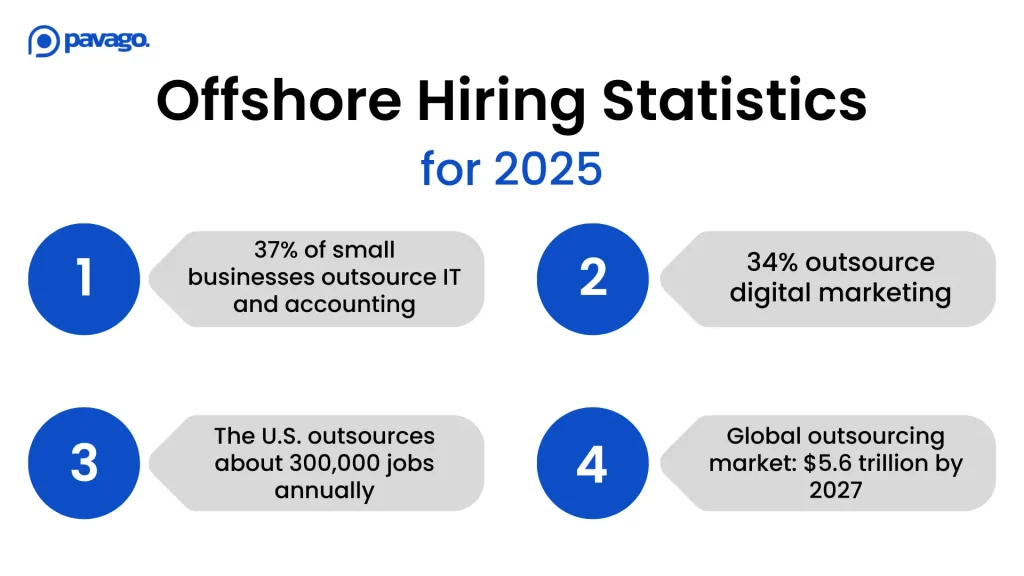If you’re reading this, you’ve probably been thinking about hiring offshore talent for months. Maybe you’ve heard the success stories. Maybe you’ve heard the disasters too.
Here’s the thing: both are true. And the difference comes down to knowing what you’re doing.
This guide covers everything you need to know to get it right the first time, based on what actually works for hundreds of U.S. businesses that are already doing this successfully.
What Are Offshore Teams, Really?
Let’s cut through the buzzwords. Offshore teams are skilled professionals in other countries who work as part of your business.
They’re not just “cheaper alternatives” – they’re often specialists you couldn’t find (or afford) locally.
The numbers tell the story:

This isn’t some experimental trend. It’s how modern businesses operate.
Why Offshore Teams Make Sense (Beyond Just Cost)
There are several benefits of hiring offshore.
Yes, you’ll save money. Companies typically see 30-50% cost savings. But that’s not the only reason to consider this.
Access to talent you can’t find locally. Need a Laravel expert? A PPC specialist with e-commerce experience? A customer service rep who actually understands your industry? Good luck finding that in your town at a reasonable rate.
Scale without the drama. Hiring full-time employees is expensive and risky. Offshore teams let you grow fast when you need to, and pull back when projects end.
Work while you sleep. Time zones aren’t always a problem – sometimes they’re an advantage. Your offshore team can knock out tasks overnight that you review in the morning.
More on this here: How Outsourcing Employees Offshore Can Help Increase Operational Efficiency
The Real Challenges (And How to Handle Them)
Let’s be honest about what can go wrong while working with offshore teams:
Cultural differences can cause miscommunication. Solution: Take time upfront to explain how your business works and what success looks like.
Time zone coordination can be tricky. Solution: Find 2-3 hours of overlap for important meetings, use async communication for everything else.
Communication barriers happen. Solution: Start with smaller projects to test communication before committing to bigger ones.
The key insight: These challenges are manageable if you know they’re coming.More on this here: Problems with Hiring Offshore Talent in 2026 (& How to Avoid Them)

Where to Actually Find Good Offshore Talent
Freelance platforms like Upwork, Freelancer, and Fiverr work for simple projects. Write detailed job posts, interview thoroughly, and always check portfolios and reviews.
Social media – especially LinkedIn and Facebook groups – can be goldmines. Join industry-specific groups and engage with potential candidates.
Specialized agencies handle the vetting and matching for you. More expensive upfront, but often worth it for important roles.
Full disclosure: Pavago is one of these agencies. We specialize in sourcing top talent from Pakistan and Latin America at 70% cost savings, with a $500 yearly membership and $329/month per candidate for unlimited placements.
Managing Offshore Teams: Proven Strategies That Work
Our CEO, Parker Cox, has built 3 successful businesses with offshore teams. Here’s what he had to say about how to manage offshore teams:
Communicate your vision clearly. Don’t assume they understand your business the way you do. Over-explain rather than under-explain.
Set specific expectations. Define exactly what success looks like, including deadlines, quality standards, and communication frequency.
Give feedback quickly. When something’s wrong, address it immediately. When something’s right, acknowledge that too.
Provide the right tools. Make sure they have access to everything they need – software, logins, documentation, training materials.
Use your time zone overlap wisely. Schedule important meetings during overlap hours. Use the rest of the time for independent work.
Build real relationships. These aren’t just contractors – they’re part of your team. Invest in team building and regular check-ins.
Don’t micromanage. Focus on results, not hours worked. Give them ownership of their work.
Want to learn more about Parker’s experience with offshore teams? Here you go: How I Build A Thriving Business with An Offshore Team
The One Question Everyone Asks When Hiring Offshore…
“What about our data? Is it safe with offshore teams?”
This is the elephant in the room that keeps many business owners from pulling the trigger. Let’s address it head-on.
Here’s what Parker had to say:
“Yes, there are real security risks. Sharing proprietary information with offshore partners exposes organizations to various security issues, including the risk of data breaches, security vulnerabilities, and privacy regulations.
But here’s what most people don’t realize: these risks are manageable with the right approach.”
Before you hire anyone offshore:
- Verify they have proper data protection certifications (ISO 27001, SOC 2)
- Ensure they comply with relevant regulations (GDPR, HIPAA if applicable)
- Check their physical security measures (access controls, monitoring systems)
- Confirm they use encrypted communication and secure file sharing
In your contracts:
- Include strict confidentiality agreements with real penalties
- Define exactly what data they can access and how it must be handled
- Require regular security audits and compliance reporting
- Establish clear data deletion policies when the relationship ends
For ongoing protection:
- Use role-based access controls (only give access to what they actually need)
- Implement VPNs and secure remote access protocols
- Monitor data access and download activities
- Regular security training for your offshore team members
Reality check: Most security breaches happen due to poor practices, not geographic location. A careless employee in your office can cause just as much damage as someone overseas. The key is having proper systems and oversight in place.

FAQs on Working with Offshore Teams
The Bottom Line
Working with offshore teams isn’t magic, but it’s not rocket science either. Thousands of U.S. businesses are already doing this successfully because they took the time to do it right, including the security piece.
The key is treating it like any other important business decision: research your options, start small, learn what works, then scale up.
Ready to get started? Here’s what we recommend:
✅ Identify one role or project that would be perfect for offshore talent – common roles include Sales Executive, Customer Service Rep, Digital Marketer, and Small Business Accountant
✅ Choose your hiring approach (freelance platform, social media, or agency)
✅ Write a detailed job description
✅ Set aside time for proper interviews and onboarding
✅ Start with a small project to test the relationship
If you want to skip the trial-and-error phase, Pavago handles everything from sourcing to onboarding and payroll.
We deliver vetted offshore talent in just one week, so you can focus on growing your business instead of managing the hiring process.
















